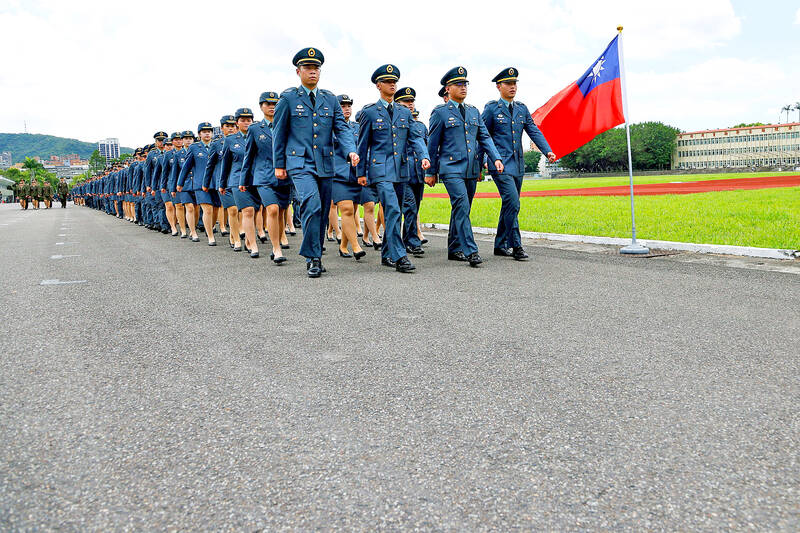President Tsai Ing-wen (蔡英文) yesterday touted her administration’s military reforms.
She also said military personnel would receive a 4 percent wage hike on Jan. 1 next year.
She made the announcement during a joint graduation ceremony for six military academies at National Defense University’s Fu Hsing Kang College in Taipei’s Beitou District (北投).

Photo: Ann Wang, Reuters
Tsai said the government has been renovating military dormitories, camps and bases to take better care of the nation’s troops.
The pay hike would be part of a proposed amendment to the central government budget bill that envisions a 4 percent pay raise for all public-sector workers.
The proposal was approved by the Cabinet on June 1 and needs to be passed by the legislature, considered a formality, as the ruling Democratic Progressive Party has a majority in the body.
Tsai also lauded her administration’s military reforms to boost the armed forces’ readiness to uphold national security.
The efforts include building domestic military jets and naval vessels, reforming the structure of the military and including female veterans in volunteer reservist training programs for the first time.
These aim to bolster the military’s combat preparedness and resilience, she said.
Tsai’s praise of her policies came as her second four-year term as president nears an end. She is to remain in office until May next year.
About 500 students received their diplomas at the joint graduation ceremony of the Military Academy, the Naval Academy, the Air Force Academy, National Defense University, the National Defense Medical Center and the Air Force Institute of Technology.
Among the students were 12 cadets from four of Taiwan’s diplomatic allies — Belize, Paraguay, the Kingdom of Eswatini and Guatemala.

‘DENIAL DEFENSE’: The US would increase its military presence with uncrewed ships, and submarines, while boosting defense in the Indo-Pacific, a Pete Hegseth memo said The US is reorienting its military strategy to focus primarily on deterring a potential Chinese invasion of Taiwan, a memo signed by US Secretary of Defense Pete Hegseth showed. The memo also called on Taiwan to increase its defense spending. The document, known as the “Interim National Defense Strategic Guidance,” was distributed this month and detailed the national defense plans of US President Donald Trump’s administration, an article in the Washington Post said on Saturday. It outlines how the US can prepare for a potential war with China and defend itself from threats in the “near abroad,” including Greenland and the Panama

A magnitude 4.9 earthquake struck off Tainan at 11:47am today, the Central Weather Administration (CWA) said. The hypocenter was 32.3km northeast of Tainan City Hall at a depth of 7.3km, CWA data showed. The intensity of the quake, which gauges the actual effect of a seismic event, measured 4 in Tainan and Chiayi County on Taiwan's seven-tier intensity scale, the data showed. The quake had an intensity of 3 in Chiayi City and County, and Yunlin County, while it was measured as 2 in Kaohsiung, Nantou County, Changhua County, Taitung County and offshore Penghu County, the data showed. There were no immediate reports of

The Chinese Nationalist Party (KMT) is maintaining close ties with Beijing, the Democratic Progressive Party (DPP) said yesterday, hours after a new round of Chinese military drills in the Taiwan Strait began. Political parties in a democracy have a responsibility to be loyal to the nation and defend its sovereignty, DPP spokesman Justin Wu (吳崢) told a news conference in Taipei. His comments came hours after Beijing announced via Chinese state media that the Chinese People’s Liberation Army’s Eastern Theater Command was holding large-scale drills simulating a multi-pronged attack on Taiwan. Contrary to the KMT’s claims that it is staunchly anti-communist, KMT Deputy

RESPONSE: The government would investigate incidents of Taiwanese entertainers in China promoting CCP propaganda online in contravention of the law, the source said Taiwanese entertainers living in China who are found to have contravened cross-strait regulations or collaborated with the Chinese Communist Party (CCP) could be subject to fines, a source said on Sunday. Several Taiwanese entertainers have posted on the social media platform Sina Weibo saying that Taiwan “must be returned” to China, and sharing news articles from Chinese state media. In response, the Mainland Affairs Council (MAC) has asked the Ministry of Culture to investigate whether the entertainers had contravened any laws, and asked for them to be questioned upon their return to Taiwan, an official familiar with the matter said. To curb repeated